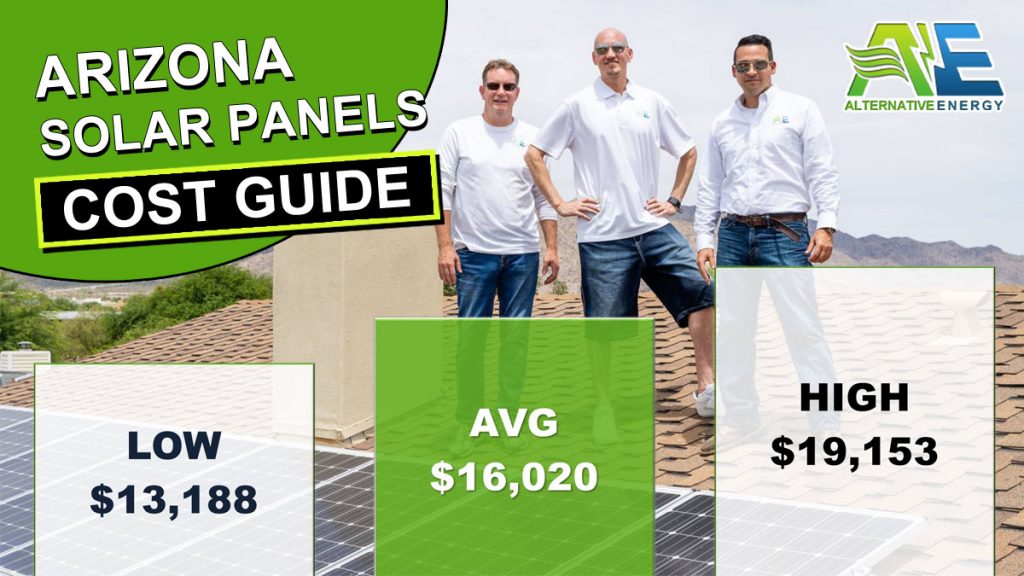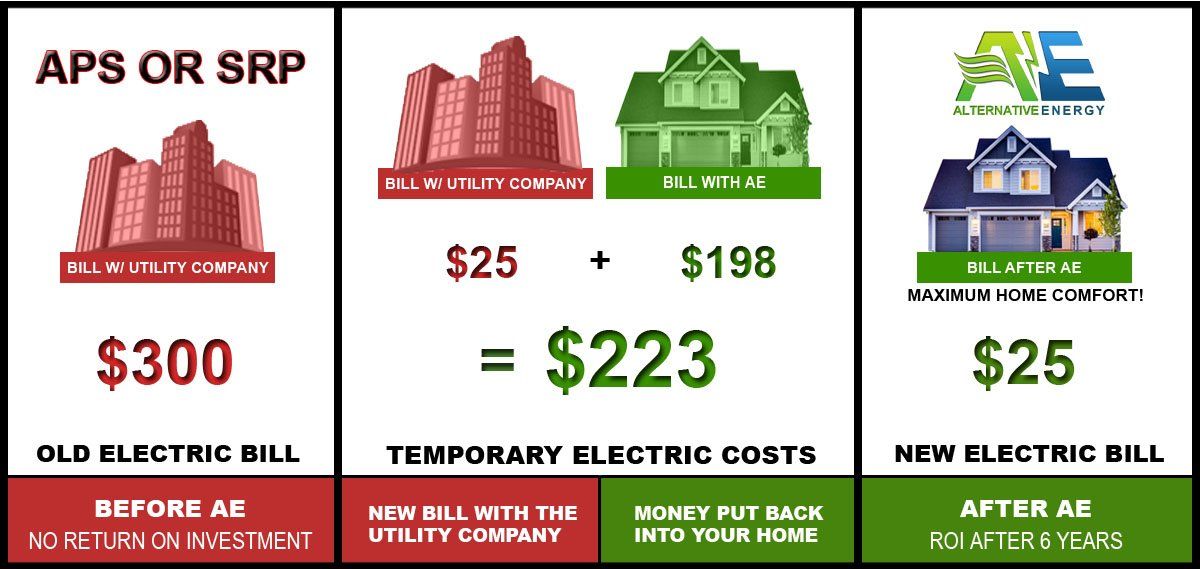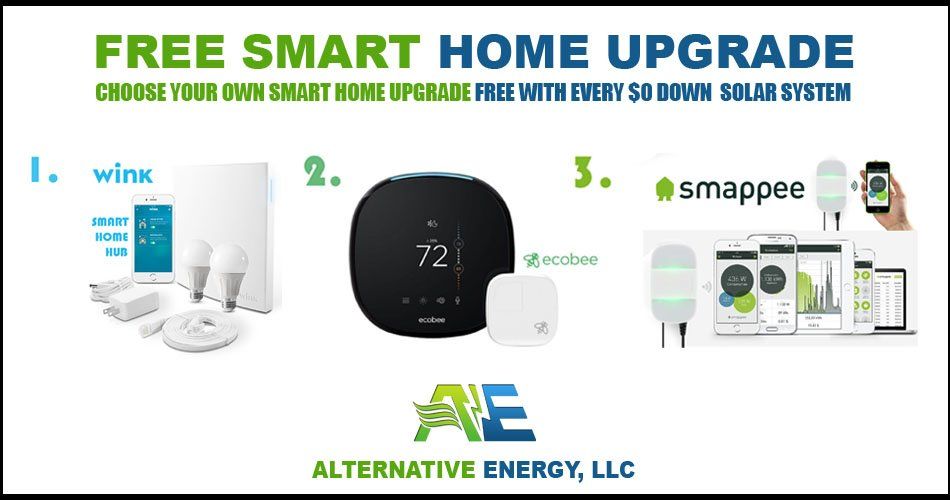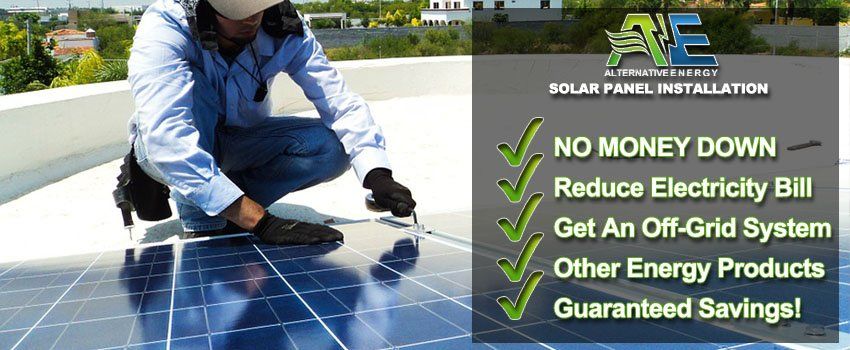
How Much Do Solar Panels Cost in Arizona?
Originally posted on https://powersolarphoenix.com/solar-panels-cost-arizona/
The average cost of solar panels in Arizona is $16,020 or $2.95 per watt. This estimated cost is based on installing an average sized 6 kW (5000 watt) solar system and before deducting the 30% Federal tax credit, 10% State tax credit, and other incentives.
- 30% Federal Tax Credit = deduct $4,806
- $1,000 Arizona Solar Tax Credit = deduct $1,000
The average cost of solar panels in Arizona after deducting solar tax credits and rebates is around $10,214. This solar cost estimate is based on installing a 6 kilowatt (6,000 watts) solar system. According to Energy Sage, “As of 2018, the average cost for solar panels in the state of Arizona is $2.67 per watt. Since the average system size in the U.S. is 6 kilowatts (6,000 watts), the average cost of a solar panel system in AZ is $16,020 before any federal or local incentives“.
Arizona Solar Calculator
Use our Arizona solar panel cost calculator to get a more specific solar cost estimate based on your annual kilowatt hours of electricity used in your home. If you are looking for solar companies in Arizona; Alternative Energy, LLC offers the lowest solar panel installation cost in the entire state of Arizona! Get a free solar quote by filling out the short quote form for a free estimate.
The Average Cost Of Solar Panels In Arizona
The average cost of panels in Arizona for a 7kW solar system is about $24,500, while the average cost of solar panels per watt is around $3.50 per watt
The actual cost of solar panels in Arizona is dependent upon how many watts of power your home uses multiplied by the current rate of solar panels per watt in the State of Arizona.
The average home in Arizona uses around 7,000 watts or 7 kilowatts in 2018-2019; with the average cost of solar panels per watt in Arizona being about $3.50 per watt; this makes the average cost of solar panels in Arizona around $24,500. That amount includes materials and installation costs.
Do the math yourself: Multiply $3.50 per watt X 7,000 kilowatts = $24,500 average solar panel cost in Phoenix, Arizona.
Solar Panel Installation Costs in Arizona are Cheaper Than You Think
Cost estimates based on installing a 5kW solar system. Find your city to see solar panel installation costs near you:
- Maricopa County, AZ: $14,750
- Phoenix, Arizona: $14,850
- Sedona, Arizona: $24,900
- Tucson, Arizona: $24,000
- Mesa, Arizona: $15,300
- Chandler, Arizona: $15,050
- Glendale, Arizona: $14,550
- Paradise Valley, Arizona: $29,000
- Scottsdale, Arizona: $14,850
- Fountain Hills, Arizona: $14,850
- Gilbert, Arizona: $15,000
- Peoria, AZ: $14,600
- Surprise, Arizona: $14,700
- Sun City, Arizona: $14,450
- Sun City West: $14,550
- Tempe, Arizona: $15,250
- Carefree, Arizona: $30,000
- Maricopa, Arizona: $14,650
- Flagstaff, Arizona: $27,000
- Goodyear, Arizona: $14,500
- Lake Havasu City, Arizona: $30,000
- Buckeye, Arizona: $14,550
- Sedona, Arizona: $30,000
- Anthem, Arizona: $24,000
- Avondale, Arizona: $14,650
- Kingman, Arizona: $25,000
- Ajo, Arizona: $20,300
- Litchfield Park, Arizona: $14,350
Alternative Energy, LLC Offers Residential Solar Panels In Phoenix, Arizona & More!

Alternative Energy, LLC is proud to announce that we offer the most affordable residential solar panels in Arizona. We offer some of the best solar deals in Phoenix Arizona. We can get you started with solar panel installation for $0 down payment when you finance. No one can beat No Money Down Solar Panel Installation. NO OTHER SOLAR COMPANIES IN ARIZONA CAN BEAT OUR PRICES because we install more than just solar panels. For example, our competitors will offer you a high priced solar system for around $30,000 to cover your inefficient energy usage, while, our company, on the other hand, will only charge you $20,000 for a smaller solar system and other energy upgrades. We can also help you maximize your Arizona solar rebates and tax incentives.

Alternative Energy, LLC ensure TOTAL HOME COMFORT, while our competitors only offer solar. Both decisions will save you 99% on electricity but choosing Alternative Energy, LLC means your home will be more comfortable too!
How Much Does It Cost Per Kilowatt For Solar Energy In Arizona?
The cost per kilowatt for solar energy in Arizona is $3.50 – $5.00 per watt, much lower than the national average price.
- Average Cost Per Kilowatt in the US: $7 – $9 per watt
- Average Cost Per Kilowatt in Arizona: $3.50 – $5.00 per watt
Just because solar is cheap doesn’t mean you should go out and buy the biggest solar system thinking it’s going to save you the most money because it won’t! I thought installing solar panels helps save money? Well, you’re right, sort of, but hear us out.
Cost Per Watt Based On Solar System Size
The cost per watt for solar will be determined based on the size of the solar system you need. For example, The way you figure out how much your system is going to cost is easy. The average sized system in Arizona is around 7 kilowatts, (7 kilowatts = 7,000 watts). Seven thousand watts multiplied by $3.75 per watt, as we can see in the chart below, would cost you $26,250 (7,000 watts x $3.75 per watt = $26,250).
- 0 – 3.4 watt solar system = $5.00 per watt = $15,000 – $17,000
- 5 – 4.4 watt solar system = $4.50 per watt = $17,500 – $19,800
- 5 – 5.4 watt solar system = $4.00 per watt = $18,000 – $21,600
- 5 – 6.9 watt solar system = $3.75 per watt = $20,625 – $25,875
- 0 – 15.0 watt solar system = $3.50 per watt = $24,500 – $52,500
*These costs are based off financing solar panels, if you pay cash for solar, you can take off .50 cents per watt across the board.
How Much Do Solar Panels Save On Electricity Bills In Arizona?
You can save as much as 97-99% on electricity by installing solar panels in Arizona. Most homeowners in Arizona see a 20 year savings solar energy savings of $25,000 by installing solar panels. Although, you are going to pay a steeper cost to do so if you ONLY decide to install solar panels. Your home or business is most likely very energy inefficient, and it doesn’t make sense to pay such high costs for solar when all you need a few energy efficient upgrades and a small solar system to save even more.
What Is The Average Electric Bill With Solar Panels Installed?
The average electric bill with solar panels is about $35 which is your solar utility payment. This estimate is assuming you installed a large enough solar system to cover your energy usage during any time of the year.
How Long Does It Take To Pay Off Your Solar Panels In Arizona?
The U.S. Department of Energy says that solar systems will only take about five years to pay for themselves. However, many of the areas throughout the U.S. Will find that solar payback time will only take three years. Any electricity that your solar system generates after the amount you have used is considered to be long-term savings on your part. For the residents in Hawaii, this will come to as much as $64,000 over as little as 20 years.
Solar Panel Installation Costs Pay For Themselves
According to the U.S. Department of Energy, a solar electrical system is going to raise the value of a property, making it worth $20 for every $1 made with the utility savings in one year. What this means is that a family that has a 3kW solar system will automatically be adding a value of $16,720 to their home. Furthermore, you can look at all the solar tax incentives to see for yourself that solar systems pay for themselves.
The Real Cost Of Operating Solar Panels
Around 30% of the total costs involved accounts for solar panels alone. Residential solar panels that are combined with a 3 – 8kW capacity cost between $17,000 – $52,000. Just because a solar panel has a high price on it does not mean that it is any better than one that is cheaper.
To judge the cost of solar panels the best way to go about it is to use the method of cost per watt ($/W), and it happens to be more convenient. The metrics will indicate the cost that is related to the electrical output. If you buy solar panels in industrial quantities, you can get them at a lower price than you could a decade ago. Currently, in industrial qualities they are being sold at $0.70/W, to translate this for homeowners, it means $1.5/W.
Balancing Out System Costs
Everything except the solar panels themselves is referred to as a balance of the system (BoS). Which will usually include at one or more inverters, wiring and all other electrical components, and mounts. Another 20% of the total cost (balance of the system (BoS). These components will cost between $3,000 – $10,000 dollars.
The Solar Inverter Costs
The inverters are used to convert direct current (DC) from the solar panels coming through alternating current (AC) and are what a home uses to run appliances, etc., and it is what allows your home to be able to grid-tie your system. Now then, 10% of total costs account for the inverters used, which in this case come to between $1,000 – $4,000.
Solar panels will typically come with a 20 to 25-year warranty; however, the conventional central inverters are going to need to be replaced much sooner than this. You can choose which inverter you would like to use between the micro-inverters and the central (string) inverters, Note: that the micro-inverters will boost the amount of power is used as well as the cost, and also an extended warranty.
Solar Panel Installation Cost
This section consists of labor costs (15%), permits, inspection fees (15%). These percentages depend on the locations; however, is usually between $2,000 – $5,000.
- Take these into account:
- Get the building and electrical permits at the Department of Building.
- The requirements of the neighborhood.
- Be approved by the Home Owners Association.
You may get lucky and get an installer that can help you out with the information you need to know about permits in your area; this is the reason we recommend hiring an installer from a larger company is always the best.
According to Think Progress, in an article titled “You’ll Never Believe How Cheap New Solar Power Is”:
“Solar energy has grown 100-fold in this country in the past decade. Globally, solar has doubled seven times since 2000, and Dubai received a bid recently for 800 megawatts of solar at a stunning “US 2.99 cents per kilowatt-hour” — unsubsidized! For context, the average residential price for electricity in the United States is 12 cents per kilowatt-hour.”
The Cost Of Operating
Operational costs between $4,000 – $8,000 (20%), includes maintenance, repairs, monitoring, insurance, and overhead costs.
Solar Tax Credits, Incentives & Rebates
Financial incentives make the solar market look good – whether there is any sunlight in the area or not! The final amount you end up paying for a solar system depends a great deal on the location you live, rebates available, tax credits available, and if you are eligible for any grants (if so, which ones?). There are some situations where the total costs may be cut more than 50%, making it possible for homeowners to own one for only a few thousand dollars. The Federal Tax Credit applies to everyone, which is at a staggering 30%. Several of the incentives have been capped at a specific power, with a cost threshold. We usually recommend a system size which is going to maximize the potential of caps and cost thresholds.
Standard Components Of A Solar System in Arizona
There is a lot more to it than just installing the panels. Generally, to install solar panels there will be four components to deal with in all PV systems:
- Solar panels, these convert the energy from the sun to make the electricity.
- Controller, regulates the flow of electricity, protecting batteries.
- Batteries, electricity is stored for later use.
- The Inverter converts the energy that’s stored into the needed voltage for running standard equipment.
It is not just one of the components that drive up the cost, but the entire system. Note: After some time the batteries need to be replaced. However, it’s expected to be seeing the cost to continually go down once the film panels are made available to the residential market, but for now, they are only being sold to commercial customers. It is in the works for Nanosolar and AVA Solar to boost up their production facilities. We will be able to see how the price targets turn out, and they may be available in volumes many times today’s output, meaning they may be at $1 – $2 per watt. That is if the cost of installation and equipment is reduced closer to $1 per watt, making the 5 kW system cost only $10,000, with the payback time down to only ten years, even if there are no subsidies. Solar system installations would then be more appealing. But, for this to work out, electricity costs would have to stay constant. If there is a continuation in the rise of fuel, it will also make the payback period shorter. For now, you can expect to be noticing more and more solar systems being on rooftops.
How Much Do Commercial Solar Panels Cost In Arizona?
The average cost of commercial solar panels depends on the number of kilowatts you need to cover your energy consumption. Generally speaking, the average cost of commercial solar panels is about $325,000. Costs ranged from $50,000 to $600,000 in 2018.
Alternative Energy Offers $0 Down Solar Panel Installation In Phoenix, Arizona
Alternative Energy, LLC is a full-service Energy Company offering $0 down solar panel installation all over Arizona. We can help with everything from solar panel installation, residential solar panels, commercial solar panels, and off-grid solar panels to residential and commercial energy improvements including patented radiant barrier technology, load controller installation and more. Get a free affordable solar panel installation quote and figure out how much your solar panels will cost.
Contact Alternative Energy, LLC today to find out how we can save you 50-100% on electricity for much lower than the price of installing a large solar system. Give us a call today at (480) 744-1803; we look forward to speaking with you!
Our Solar Panel Installation Service area includes the all major Arizona cities including: Phoenix, Tucson, Mesa, Chandler, Litchfield Park, Glendale, Ajo, Paradise Valley, Scottsdale, Fountain Hills, Gilbert, Tempe, Carefree, Cave Creek, Peoria, Surprise, Yuma, Avondale, Flagstaff, Goodyear, Lake Havasu City, Buckeye, Sedona, Flagstaff, Kingman, Goodyear and more.
PAY NOTHING DOWN! Over the past several years’ people have been purchasing Solar panels using the method of ‘Power Purchase Agreements’ (PPA’s), ‘Third-party-owned’, and ‘Pay-as-you-go’ solar. These models are to reduce upfront costs. It is their arrival in the past several years that has helped them grow.
It is now possible for homeowners to have solar and pay nothing down, generating savings from day 1. The way that leasing works are instead of having an electricity bill to pay, you would be leasing a solar system, paying only a fixed rate for the electric that gets produced, being cheaper, and that rate can be locked in for up to 15 years.


